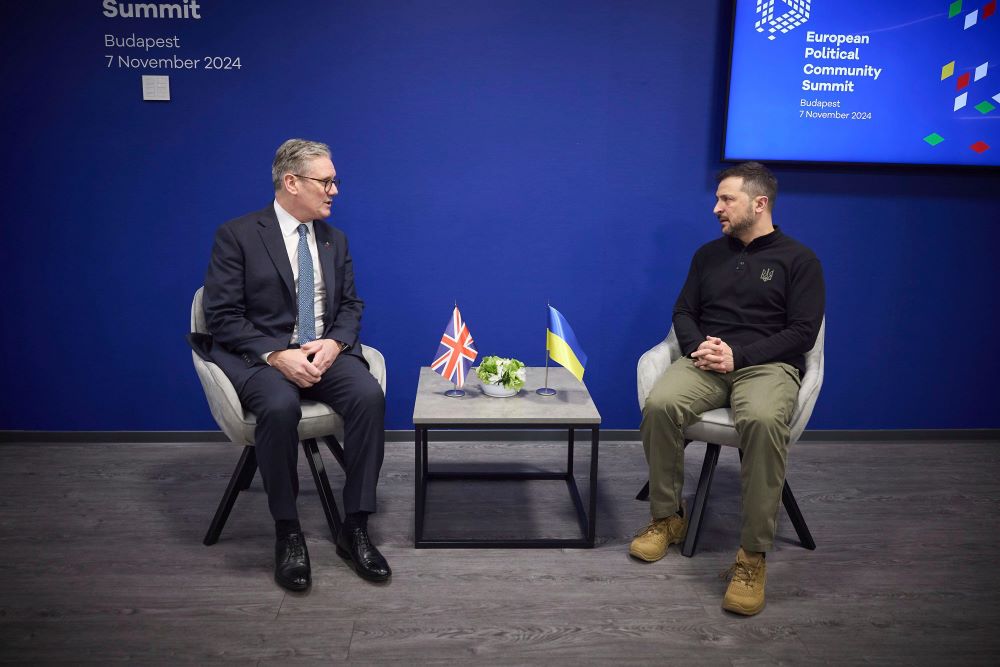Three Quarters Of People Say The World Is More Dangerous Now Than Five Years Ago
Prime Minister Keir Starmer and Defence Secretary John Healey
4 min read
Nearly three-quarters of people believe the world feels more dangerous now than it did five years ago, new polling shows.
According to the findings of a new Savanta survey, 73 per cent of respondents believe the world feels "somewhat more dangerous" (41.2 per cent) or "much more dangerous" (31.6 per cent) than it did half a decade ago.
On the other hand, just 10 per cent of people said the world feels safer, with 3.2 per cent saying "much safer now" and 6.3 per cent "somewhat safer now".
Chris Hopkins, UK Political Research Director at Savanta, said: “An overwhelming majority of Brits feeling the world is more dangerous now than it was five years ago probably comes as no surprise, where the conflict in Ukraine was the turning point.
"For many, that was a form of conflict much more straightforward for the public to understand and, due to its proximity and aggressor, far closer to home than other ongoing conflicts in Africa or the Middle East.”
Reacting to the findings, former defence secretary Grant Shapps said the UK must "accept" that it is dealing with "a more dangerous world".
Speaking on PoliticsHome podcast The Rundown, the ex-Tory Cabinet minister said: "I would say the greatest danger is not to accept that it's a dangerous world.
“Although there are a variety of different reasons and different conflicts that are making things particularly tricky – much of it interconnected, like the connections between Russia, China, North Korea and Iran – the real danger is that we carry on in a slightly complacent Western manner, almost as a parody of the way that Vladimir Putin thinks of the slightly soft and lazy West, and in doing so, we fail to notice the real dangers."
Nearly 80 per cent of respondents (77.9 per cent) told Savanta the world feels dangerous at the moment, while 21 per cent said it feels safe.
The findings come as the UK finds itself responding to several global threats including Russia's ongoing assault on Ukraine and conflict in the Middle East.
At the same time, against this backdrop, the UK and other Western countries are under growing pressure to increase their defence spending – not least because President-elect Donald Trump has suggested that he could scale back US support for NATO.
Prime Minister Keir Starmer has said that the Labour Government will set out its plans to raise UK defence spending to 2.5 per cent of national income in the spring.

When respondents were asked which country posed the "biggest threat to global peace", by far the most common answer was Russia (64 per cent).
Israel was the second most common answer (8.4 per cent), while the US was third (8.0 per cent).
Just 4.4 per cent of people said China, suggesting that concerns in Westminster over the rise of Beijing have not yet cut through with the general public.
Tobias Ellwood, former Conservative MP who chaired the Defence Committee, told the same podcast he was "pleased to hear that the public is recognising that the world's getting more dangerous", arguing that the UK is already in a "form of war" with Russia.
"Given what they're doing in the cyber security space, what they're doing with disinformation and so forth, even assassinations on British soil...
"They are trying to disrupt, to sow political discord, to cause economic harm from afar – because that is the new character of conflict."
The former Tory minister added: "The bigger picture is that we [Britain] have actually had it easy since the end of the Cold War. We've become complacent."
Labour MP Emily Thornberry, Foreign Affairs Committee chair and former shadow foreign secretary, told The Rundown there is a "deepening alliance" of Russia, North Korea and Iran that the UK "should be definitely alarmed by", and that "the growing dependence of Russia on China is something we need to be mindful of".
The Savanta survey of 2,136 people was carried out between 27 and 28 November.
